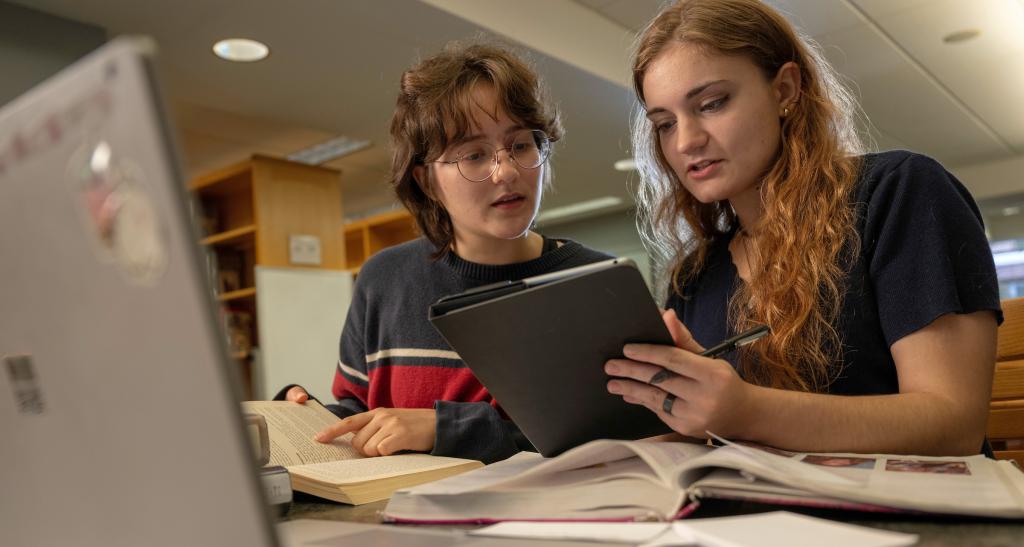You’re More Than Your Major
At York College, you won’t just spend all of your time in your specialized area of study — we encourage students to embrace educational versatility.
Generation Next, our approach to general education, is more than a required class — we want students to align their coursework with their ambition. Gen Next is a chance to explore a breadth of academic areas that complement your major and expand your education through academic experiences of personal interest to you.
The Core of Gen Next
In the four phases of Gen Next, you’ll take personalized and customizable classes that align with your passions while helping to expand on them.
Start your journey with a dynamic introduction in York College’s First Year Seminar (FYS). Dive into the essence of a York College education, connect with your peers, and gain the academic edge you need for a successful college experience.
Course requirements:
- 3 credits
Continue your academic journey with foundational courses in Communication, Advanced Communication, Quantitative Fluency, American Citizenship, and Global Citizenship. Lay the cornerstone for lifelong learning and skills that extend beyond your major — setting the stage for a comprehensive educational experience.
Course requirements:
- 6-12 credits
- The second Advanced Communication requirement, the Quantitative Fluency requirement, and the American or Global Citizenship requirement may be satisfied by major program requirements.
- Programs may choose to require additional Foundation courses at their discretion
Explore the intricacies of diverse academic disciplines through Disciplinary Perspectives courses, unraveling the methodologies that shape knowledge in each realm. These courses not only introduce concepts but also provide a foundation for interdisciplinary connections. Gain a broad understanding that empowers you to navigate in-depth projects across various disciplines, fostering a comprehensive approach to your major and beyond.
Course requirements:
- 9-12 credits
- Taken in Arts, Humanities, Social and Behavioral Science, and/or Natural and Physical Sciences
- One of the four Disciplinary Perspective areas may be satisfied by major requirements
- Programs may choose to require additional Disciplinary Perspective courses at their discretion
Elevate your academic journey with Constellations — vibrant communities exploring interdisciplinary themes. These courses, embraced in your junior and senior years, weave together skills from Foundations and knowledge from Disciplinary Perspectives, offering a personalized journey through Generation Next. Declare your Constellation by 45 credits with guidance from your academic advisor, fostering deep exploration, connection-making, and integration across your major, minor, and personal interests.
Course requirements:
- 9-12 credits
- Students will take 4 three-credit courses drawn from a minimum of three disciplines
- One of the 4 courses may also serve as a major program requirement
- Students may use courses for academic minors. Programs with required minors may have courses count for both the minor and the Constellation
- Students may also take TWO courses in the grouping of courses called High Impact Practice and Innovation (HIPI) courses, that focus on study abroad, project- or problem-based learning, community-based learning, interdisciplinary undergraduate research, service learning. Students do not declare the HIPI grouping, but may take two HIPI-approved courses to take the place of theme-based Constellation courses
Building Skills to Take You Further
The Generation Next program is an experience crafted for you to expand and complement your education. You will gain skills and abilities in this program that push you beyond the niche focus of your core area of study.
Critical and Creative Thinking
YCP students locate and analyze relevant and accurate sources of information, employ appropriate research and creative methods, and consider interdisciplinary perspectives to develop new and useful solutions to a range of questions, problems, and issues.
Communication
YCP students effectively and ethically communicate ideas and information with diverse audiences using the appropriate media and genres for a range of academic, personal, professional, and public situations.
Quantitative Literacy
YCP students effectively analyze, interpret, and communicate quantitative data and information to identify, explore, and respond to questions, problems and issues appropriately and ethically for a range of situations.
Citizenship and Intercultural Competency
YCP students demonstrate the awareness, attitudes, knowledge, and skills required to effectively and equitably engage, include, and collaborate with people from different local and global cultures.
Professionalism
YCP students proactively engage with career-readiness to develop professional identities, behaviors, skills, and practices through continual reflection on their strengths and areas for growth, exploration of career and professional opportunities, and networking to build relationships.


